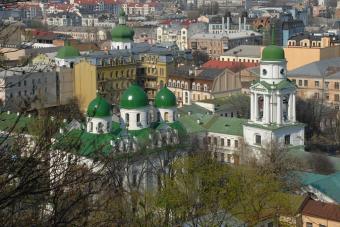The quality of postgraduate education and prices in our universities most often do not correspond to their foreign counterparts. This is confirmed by the rating compiled by The Times newspaper. It contains a list of the 200 best universities in the world. And there is not a single domestic university in it! Therefore, more and more young professionals are flocking abroad in search of a decent education. What are the nuances of studying in graduate school abroad? How and in what order should you act to get there? Let's look at these questions in more detail.
What is graduate school?
Postgraduate studies are a system for training scientific personnel at higher educational institutions, following one or another stage of higher education. The result of postgraduate study is obtaining the highest qualification of a candidate of sciences. The graduate student carries out independent research work, the results of which he uses to write a Ph.D. dissertation. After its successful defense, he receives a Ph.D. degree.
How the graduate school works
The path to defending a PhD dissertation is thorny and full of difficulties. During your studies, you need to spend a lot of time in the library searching for the necessary information, not missing classes, finding solutions to various research problems and passing candidate exams. According to the method of study, postgraduate studies are:
- Correspondence courses, in which training is carried out on the job.
- Full-time with a break from production.
Pros of graduate school
In addition to the main purpose, preparing and defending a candidate’s dissertation, graduate school provides the opportunity to carry out scientific activities and participate in conferences and symposia, to deepen one’s knowledge in one narrow field. In addition, this stage is required if you plan to defend your doctoral dissertation in the future. It is also possible to make a discovery on a global scale and subsequently receive rewards and recognition from the scientific world community during this period. 
Features of admission to graduate school in various foreign countries
The answer to the question: “Do I need a degree? "Everyone will have their own. If you decide that this option for continuing your scientific career is acceptable to you, and you prefer to pursue it abroad, you, regardless of the country, will need to act in this order:
- submitting an application to the university you like (possibly online) and receiving a response;
- providing the embassy with a certificate of account in national currency (each country sets its own minimum);
- completing a language learning course and upon completion receiving the appropriate certificate (German DSH, English IELTS or TOEFL);
- registration of a foreign passport with provision of a certificate of admission to a foreign graduate school to the OVIR;
- payment for health insurance in the country where you plan to study (price $100 per year);
- visa registration (takes about 2 months, in some cases up to 4).
As for the choice of country and university itself, English and German universities are traditionally considered prestigious. Interesting options for free foreign postgraduate study are offered to foreigners by Finland and Canada. Recently, graduate school in China has gained popularity. Let us consider the features of training foreign graduate students in different countries of the world in more detail. 
England
Here, high demands are placed on applicants to graduate school, regardless of whether they are English or foreign. The latter are recommended to take a preparatory course before graduate school. Basically, having a higher education is mandatory. However, there are certain universities where you can enter after college, having impressive work experience in the relevant specialty, at least 3 years. The English education system is characterized by a high degree of specialization. You must first register for a DPhil course. After successfully conducting scientific work, the level can be converted into a PhD.
A prerequisite for admission to graduate school in England is proficiency in English. Its knowledge is tested by one of the following tests (you must score at least 550 points): Cambridge Proficiency in English (CPE), IELTS international language proficiency test and TOEFL.
20 of the most prestigious universities in England are part of the Russell Group. These universities account for about 65% of all grants allocated to science and 55% of academic degrees awarded. Among the top five universities in the country:
- Cambridge
- University College London
- Imperial College London
- Oxford.
Germany
Until 2005, higher education and postgraduate studies in Germany were inexpensive or free for foreigners. Accessibility caused the illusion of permissiveness and lowered the overall level of academic performance. Since 2005 the situation has changed. The German Constitutional Court gave each city the right to independently determine the amount of tuition fees at a university. Thus, the authorities achieved an increase in the quality and value of German higher education and improved its material base. 
As a result, free education remained in Brandenburg, Berlin, Mecklenburg-Vorpommern and Schleswig-Holstein. All other universities have become fee-paying. To enroll in a German graduate school, a foreign student must have a document confirming his completion of higher education. The best graduate students at state universities are paid a stipend. List of universities in greatest demand:
- Westphalian Wilhelm University;
- Ruprecht-Karl University Heidelberg;
- Karlsruhe Institute of Technology;
- Free University of Berlin.
Finland
Scandinavian countries such as Finland offer postgraduate studies to foreign specialists in both English (TOEFL certificate required) and local Finnish. The latter is quite difficult to master, but there are many courses in the country where it is studied for free. In addition, difficulties for our citizens include obtaining a visa, for which they must have at least 6,000 euros in their account.
Postgraduate study in Finland is not a cheap pleasure. Even if you manage to study for free, the accommodation itself will cost a pretty penny, and working part-time at first without knowing Finnish is almost impossible. The exception is working as a programmer. Prestigious Finnish universities are:

Canada
Science in the country of the maple leaf is generously dated from the budget. It is possible to study in graduate school in Canada for free, depending on the level of knowledge and the chosen specialty. It also matters how much you can interest a Canadian university professor in your work so that he agrees to become your supervisor. In this case, the scholarship to the foreign graduate student is paid from the grant allocated to the professor.
To be admitted to a Canadian graduate school, you must have a high GPA (the exact required figure varies depending on the university) and a certificate of passing any language exam. Among the top universities in Canada that accept foreign graduate students are:
- University of Toronto;
- University of British Columbia;
- McGill University;
- York University.
China
The rapid growth of all spheres of life in China, from industry to economics, has generated serious interest in it from students. Postgraduate studies in China are in global demand due to the optimal cost/quality ratio of services. To study in China, your Chinese language proficiency must be at least level 4 on the HSK test. If the applicant fails the test, he must attend language courses for a year and retake the language exam. There are postgraduate programs in English in China, but they are very expensive, and the choice of specialties is limited. The graduate student does not have the opportunity to choose a supervisor on his own. The university assigns it to him. The education system itself is similar to the Russian one. Universities in China included in the top 200 best universities in the world:

Poland
For postgraduate studies in Poland, it is of fundamental importance whether you own a Pole's Card (a document confirming the presence of Polish roots). In this case, there is a real opportunity to study in Poland for free while receiving a scholarship. Otherwise, you need to take a Polish language course and enroll in graduate school for a fee. The best Polish universities worth paying attention to:
- Leon Kozminsky University;
- Warsaw Academy of Finance and Business Vistula;
- Lazarski University;
- University of Civitas.
Documents required for admission to graduate school abroad
Each university has its own procedure for admission to graduate school. However, the list of required documents is approximately the same. It includes:

Tuition fees
The cost of postgraduate study in England ranges from 6,000 to 9,000 pounds per year. The same amount will need to be spent on accommodation and meals. With the support of the British Council, Russian citizens are provided with grants on a competitive basis. With their help, 40-50 people annually undergo postgraduate studies abroad for free. Similar programs operate in other countries (Germany, Italy, Sweden, Finland). But not everyone manages to use them. Paid postgraduate studies in Germany range widely from 350-900 € per semester.
Polish postgraduate studies will cost from 1600 to 2000 € when studying in English, in Polish - 800-1200 € per year. In China, the cost will be 2500-4000 dollars in addition to additional costs for literature and accommodation.
Thus, we can conclude that domestic education annually increases in price (but not in quality) and loses position in international rankings. Against this background, postgraduate study abroad looks more than attractive. Going to study abroad is much easier than it seems at first glance. The main thing is perseverance, determination and strict adherence to our recommendations.
How will the rules for admission to graduate school change this year? Which universities offer postgraduate scholarships of 45 thousand rubles per month? Will defending a candidate's dissertation be mandatory? Chairman of the Higher Attestation Commission of the Russian Federation, rector of RUDN University Vladimir Filippov tells the RG about this.

Vladimir Mikhailovich, will it become easier to enroll in graduate school?
Vladimir Filippov: No, it's not easier. But admissions become more objective and transparent. In addition, universities are given more independence. They can themselves determine the list of entrance exams, the grading scale, and the minimum number of points that gives the right to participate in the competition. It is very important that different specialties are now given the right to conduct separate entrance examinations and hold competitions in each area. We at RUDN University will award additional points for patents and publications, because for a person who goes into science, not only grades are important, but also scientific achievements. Although there is one “but”. The new rules are unified for the admission of Russian citizens, but there may be difficulties with the admission of foreigners. In some countries, the school year ends in February. And if we cannot accept graduate students earlier, they will leave for universities in other countries. Even graduate students with directions to budget places come to us until October - November. Almost 3 thousand people study at RUDN in graduate school and residency, and for us this is the most important issue.
So, universities have the right to conduct exams as groups are formed. And you can even bring your diploma after submitting your application. Will someone be able to come and take exams in March, and someone in August?
Vladimir Filippov: If groups have been assembled and studies for them began on September 10 or 15, I cannot make a separate schedule for foreigners and start classes with them in November or December. This means that after September 10 or 15, foreigners cannot be accepted. Even if they come under a quota. At the same time, no one can take their place either. What should I do? It must be stipulated that universities that have a quota for foreigners can themselves determine the timing and stages of admissions tests to graduate school.
24.3 thousand places are allocated on the budget for graduate students, residents and assistants
Is it true that there are graduate students at RUDN who have a scholarship of 40 thousand rubles a month?
Vladimir Filippov: Not 40, but 45 thousand. This is called full-time graduate school. Last semester, 23 people studied in this graduate school, and since February we have selected 22 more. By October 1 next year, I think, 100 people will receive our scholarship of 45 thousand rubles, plus another 5-6 thousand rubles - a state scholarship. We select full-time graduate students through competition. A person works from 9 to 18 hours at the department, in the laboratory, and is not looking for a part-time job. We pay increased scholarships from extra-budgetary funds of the RUDN University, including those received under the program for increasing the competitiveness of universities 5-100. It seems to me that all universities should be given the opportunity to increase their support for graduate students. I understand that finding additional funds within universities is not always possible within the framework of money for science. Therefore, one of the options is to reduce the number of postgraduate places and sharply increase the stipend.
Maybe at the same time making it mandatory to defend a Ph.D. dissertation?
Vladimir Filippov: The average rate of defending papers in graduate school is only 25-30%. As the chairman of the Higher Attestation Commission, I believe that the main task of graduate school is the preparation of a dissertation. Moreover, already as the rector of RUDN, I want to say that as soon as defending a dissertation became optional in graduate school, and such information spreads very quickly, some foreign students began to think: why go to Russia for graduate school if neither the supervisor nor the department is aimed at dissertation defense?
In full-time graduate school they study from 9 am to 6 pm, receive a stipend of 45 thousand
What specialties do graduate students from abroad come to us for?
Vladimir Filippov: First of all, these are mathematics, physics, chemistry, biology, biotechnology. We have good dissertations in the field of medical sciences. Postgraduate studies in engineering are highly valued. Sometimes people ask me what needs to be done to ensure that a Russian PhD in mathematics is equal to a Western PhD? Nothing! The level of the vast majority of our PhD theses in physical and mathematical sciences is much higher. Moreover, we are sometimes asked to recognize documents from other countries at the doctoral level, and the Higher Attestation Commission often refuses. We say that a dissertation is only suitable for a candidate. Another thing is that we had discrepancies with Western doctoral studies (for the PhD degree) in the number of exams for graduate students. But now this formal reproach has been lifted. According to the new rules, in graduate school there will be not three, but many exams.
Are you interested in humanities? Economics, for example, might be of interest to foreigners?
Vladimir Filippov: Our economic dissertations should be built not on theoretical conclusions, but on mathematical analysis and the use of mathematical methods. If economics is based on exact sciences, it will become useful for practice. So far, our economic dissertations mainly solve local problems within Russia.
In Russia, interest in mathematics is falling. Almost 8 percent fail on the Unified State Examination in mathematics. From whom should we recruit graduate students in economics?
Vladimir Filippov: And yet, as part of the Unified State Examination, mathematics is compulsory for everyone. Both future humanities students and future doctors take this subject. Another thing is that higher education in Russia has become widespread. Forty years ago, 20-30 percent of graduates entered universities. Now it’s 70-80 percent. This is where the screening happens. In the context of mass higher education, the task of a university is to create opportunities for those who can and want to study. And there are no fewer such guys. Today students have a lot of opportunities. The time when teachers chewed material and brought it in a beak is over. Now we need to learn on our own. Especially in master's and postgraduate studies. This is exactly how all Western universities work. But not all of our teachers are ready to rebuild and work in a new way. Over the decades, they have become accustomed to the fact that they need to read a full course of lectures and then take an exam. But why should agronomists, engineers, and philologists lecture in person on the “History of Russia” in the traditional “talking head” format, when you can offer an interesting multimedia course available to all students via one hyperlink? This year we have involved approximately 600 out of 1,800 teachers in such work. Already 2,800 students use our telecommunications and information system, which we call “TUIS RUDN”. It is designed to ensure that academic disciplines are presented in an accessible multimedia format, that the homework system is built using IT solutions, and that teachers work more actively with answers in electronic form. The new system also encourages students to work, but at the first stage it requires much more restructuring for the teachers themselves.
After graduating from university, graduates are faced with the extremely important question of choosing a future path in life: whether to go to work in their specialty, choose another profession, go to get a second higher education, or realize themselves in science. As a rule, only a few people choose the last path. Enrolling in graduate school is a responsible step, meaning a willingness to devote your life to science. Moreover, in our country, almost free of charge! Because a scholarship for a graduate student with no work experience is not much different from a scholarship for an undergraduate, and science requires sacrifice. Material. And sometimes quite significant. The financing of almost all universities in our country leaves much to be desired. However, this fact often does not stop those wishing to create a career in science. What motivates such people? Who needs admission to graduate school and why?

The conditions for admission to graduate school are less stringent than it seems to the majority of graduates:
- You have the right to enroll if you have a diploma in your chosen specialty and certain successes in it.
- You will need to communicate with your proposed supervisor and gain their support.
- Pass There are three of them: in the chosen specialty, philosophy and foreign language.
- Have scientific publications within your topic (if there are none, an abstract).
- Carry copies of your documents and photographs with you. As well as a medical certificate about your health status.
In fact, if you have an agreement with your supervisor, everything else is just a formality.

Enrolling in graduate school is an important decision in life, so before making it, think again about whether you are sure that you want to sacrifice your life on the altar of science.
Before entering graduate school, it is necessary to clearly understand that graduate school is a form of postgraduate education designed to form scientific and teaching staff to work in higher educational and scientific institutions. It is necessary to critically evaluate your inclinations and decide for yourself the question of the advisability of entering graduate school and staying for 3-4 years as a graduate student.
In accordance with the federal law “On Higher and Postgraduate Professional Education”, “A graduate student is a person who has a higher professional education and is studying in graduate school and preparing a dissertation for the academic degree of Candidate of Sciences.” Thus, citizens of the Russian Federation with higher professional education are admitted to graduate school. Admission to graduate school is conducted on a competitive basis.
To graduate school on a budget You can enroll either immediately after graduating from a higher educational institution or after gaining practical experience in the profile of your chosen specialty.
For admission to graduate school immediately after graduating from higher education institution it is necessary to have personal creative results in research work in the chosen specialty, which is confirmed by the presence of a recommendation for admission to graduate school from the Academic Council of the educational institution. Such recommendations are accepted not only at the university where the student studied, but also at other universities in the field of scientific research performed by the student.
Applicants to graduate school on a budget with work experience must have worked in the profile of their chosen specialty for at least two years.
Citizens no older than 35 years old are admitted to full-time graduate school, and citizens no older than 40 years old to part-time graduate school.
View postgraduate schools: postgraduate schools in Moscow, postgraduate schools in Russia, postgraduate schools in the CIS.
Persons who meet the above requirements on the basis of an application for admission to graduate school are allowed to take entrance examinations to graduate school on a budget basis.
TO Application for admission to graduate school is attached:
The admissions committee, after reviewing the submitted documents, as well as the department’s assessment of the abstract (published scientific works), makes a decision on admission to the entrance exams.
All applicants to graduate school on a budget pass competitive entrance exams on:
-special discipline;
-philosophy (history of science);
-foreign language.
Entrance exam programs and exam tickets can be found on the websites of universities.
Persons who have passed candidate exams in philosophy and a foreign language may be exempt from the corresponding entrance exams when entering graduate school.
The decision on admission to graduate school on a budget is made by the admissions committee based on the number of places and the results of entrance exams
Persons admitted to entrance examinations for graduate school, in accordance with current legislation, are granted vacations lasting thirty calendar days while maintaining the average salary at the place of work.
Admission to graduate school on a contract basis is carried out by universities both on the basis of an interview and taking into account the results of passed entrance exams. Detailed information about the contractual form of training can be found on the websites of the relevant universities.
For questions regarding choosing a graduate school, enrolling in graduate school, or writing a dissertation, you can





